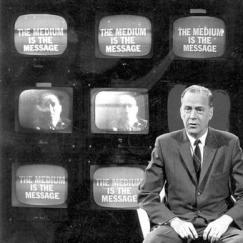If students are not trained to ask basic questions about the images which confront them, if they are not asked to examine the knowledge and assumptions which they already possess, they are being denied the opportunity to develop the most simple and essential critical tools.

Lance Strate


Marshall
The experience of suddenly
The experience of suddenly getting McLuhan has been described as akin to a religious experience by some or in more general terms as an epiphany; to use a term popular during the sixties, I was able to grok McLuhan (grok was coined by the science-fiction writer Robert Heinlein in his novel Stranger in a Strange Land to refer to an extreme form of understanding and empathy). In visual terms, it was the kind of experience depicted in comic strips of a light bulb being switched on over a character’s head, which would certainly be fitting, given that McLuhan argued that electric technology and electronic media constituted the basis of a revolution that was reversing the course of some three millennia of Western civilization.
Television was the specific electronic medium that had pushed our culture over the edge, he argued, and one of the characteristics of television was its low resolution image, which McLuhan compared to that of the printed cartoon, which elevated the comics medium in importance (see Scott McCloud’s insightful, McLuhan-inspired graphic nonfiction, Understanding Comics [1993]).
This idea had no small significance for me because I had been reading comics since before I could read (my parents read them to me), despite the fact that the hybrid medium was often disparaged by teachers and others arguing in defense of elitist literary culture. The fact that comics crossed—or, if you like, transgressed—the boundary between literate and pictorial media contributed to my own developing awareness of differences among media, differences in their biases towards different types of content, differences in their effects on the ways we think, feel, act, perceive, and organize ourselves, differences that McLuhan famously summed up by saying, “The medium is the message” (1964, p. 7).
The image of a light bulb turning on is a visual metaphor for an idea (the word is derived from the Greek term for seeing) and perhaps the most basic way of describing the effect of my reading The Medium Is the Massage was that I was suddenly able to see the world from an entirely new perspective (in addition to being a field or intellectual tradition, media ecology has often been referred to as a perspective, although I prefer to use approach in order to avoid the visual metaphor). Or, to invoke Aldous Huxley’s well-known phrase, used to describe his experiments with hallucinogens, the “doors of perception” suddenly opened for me. The reference to perception is particularly significant because McLuhan’s specific approach to media ecology emphasized the primary role that sensory organs play in our thought processes.